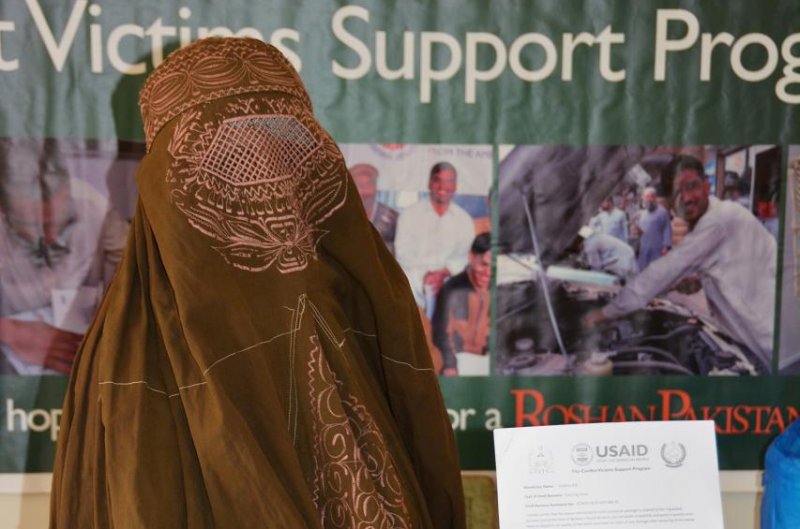A women receives small business assistance from USAID's Conflict Victim Support Project. Photo courtesy of CVSP
PESHAWAR, Pakistan, June 23 (News Lens Pakistan) -- Five years ago, Zarin Taj's family was torn apart by a bomb blast at a police station in the Kohat District of Pakistan's Khyber Pakhtunkhwa province. A daughter and a son were both badly injured in the blast.
When Taj approached local authorities for some aid to help offset medical cost and other expenses, she was ignored.
"No one supported us," said Taj, 40, whose daughter still bears scars from the terrorist attack.
Taj's family is among thousands in Khyber Pakhtunkhwa and the adjacent Federally Administered Tribal Areas that have suffered as the government ratcheted up its war on terrorism after the Sept. 11, 2001, attacks on the United States.
Data compiled by South Asian Terrorism Portal, a New Delhi-based website on terrorism and low-intensity warfare in South Asia, indicates 4,739 civilians and 1,699 security force personnel have died in Khyber Pakhunkhwa since 2005. More than 2,500 civilians and 1,379 security force personnel have died in FATA between 2009 and February 2014 in terror attacks.
Khyber Pakhtunkhwa in February released almost $500,000 to compensate them. But the money has not been dispersed because of lack of legislation.
"The government is working to address the issue of victims of terror," Arif Yousaf, a provincial assembly member who is also a legal adviser to the chief minister for law affairs, told News Lens.
Adnan Sher, head of the U.S. Agency for International Development's Conflict Victim Support Project -- which provides small business support, training and other help for civilian victims in Khyber Pakhtunkhwa and FATA -- told reporters in March that funds released by the government would be managed by the Provincial Disaster Management Authority, a government agency set up to look after victims of disasters. He said an independent monitoring board would also be established to identify deserving victims.
There is some debate over whether the money set aside is to be dedicated to terrorism or disaster victims.
Muhammad Khalid, director of human resources and administration for the Provincial Disaster Management Authority, told News Lens that the funds were for disaster victims but that authorities were "making a mechanism so conflict victims would be compensated in this fund."
Critics say this money would only help a few victims and is not a long-term solution.
"Proper legislation is needed for tackling the issue," Sana Ejaz,a Peshawar-based human rights advocate, told News Lens. "We can give credit to nongovernmental organizations that provide support for these victims of terror more than government institutions."
Naveed Yousafzai, of CVSP, told News Lens that over 2,500 terror victims have enrolled in vocational training, including programs for driving, plumbing, computer repair, maintenance of motor vehicles and tailoring.
The program also provided 2,881 educational scholarships to the children of families who had "a member killed or injured in a terror attack in the past seven years," Yousafzai said.
Taj and her family have benefited from the USAID project -- among other things she and her daughter were offered three months of training in tailoring.
The project provided her $100 a month in scholarship during the three-month training period and is providing scholarship assistance for her children, she said.
Taj's husband, Ishfaq, 50, said the money has eased the family's financial troubles, saying she is now sewing clothes, work that is worth about $1.50 to $2 per day.















